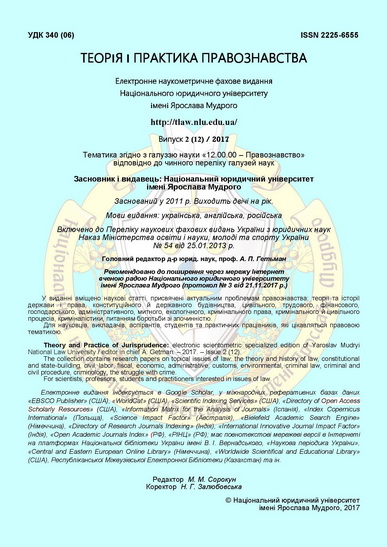General characteristics and types of subjective duties in corporate legal relations
DOI:
https://doi.org/10.21564/2225-6555.2017.12.115429Keywords:
subjective duty, right, legal relationship, regulative, protective, protectionAbstract
The processes of reforming social relations in the conditions of integration ofUkraine's economic system into the European community call for the improvement of domestic legislation in this area and the scientific substantiation of the legal problems that arise there. One of these problems is the essence of subjective responsibility in corporate legal relations.
Legislative regulation of corporate legal relations takes place through the establishment of certain rights and responsibilities for participants in corporate relations. It should be noted that the legislator in the overwhelming majority pays attention to subjective rights, from this it is made a preliminary conclusion that in the corporate legal relationship, the content center of gravity is focused on rights. However, one should agree with those scholars who at one time expressed the idea that there can be no rights without responsibilities, there can be no responsibilities without rights. On the one hand, these are paired categories, and on the other, they are two separate categories.
Consequently, the purpose of this article is to reveal the general characteristics of subjective responsibility in corporate legal relations.
In general, in theory under subjective right should be understood as the measure of permitted behavior of the authorized person in legal relationships. Subjective responsibility is a type and measure of the necessary and proper conduct of the obligated person in legal relationships.
From the analysis of legislation, subjective responsibility in corporate legal relationships can be divided into: a) general; b) special; c) local; d) mixed.
General – these are the responsibilities inherent in the participants of all types of business associations.
Special – responsibilities, stipulated for participants of a certain type of economic partnership.
Local – responsibilities defined by constituent and other local documents.
Mixed – a set of general and local or special and local responsibilities, as well as a set of general, special and local responsibilities.
Some scholars are trying to divide responsibilities depending on the division of legal relationships into a regulative subjective responsibility and a protective subjective responsibility. In the article the author concludes that, depending on the division of corporate legal relations on the regulative and protective subjective obligation, it is possible to classify only on the basis of regulation, on the protection of the grounds classified subjective right. Consequently, subjective right is characterized by the sign of regulative and protective, and the subjective responsibility is classified solely on the basis of regulatory.
Under the regulative subjective responsibility should be understood as a proper rule of conduct of participants in corporate legal relationships in a voluntary manner.
References
Smityukh, A.V. (2016). K voprosu o opredelenii ponyatiya korporativnogo pravootnosheniya. Pravova derzhava, 24, 134–141 [in Ukrainian].
Luts, V.V. (2017). Sutnist sub’iektyvnoho korporatyvnoho prava. Korporatyvne pravo Ukrainy ta yevropeiskykh krain: pytannia teorii ta praktyky: zb. nauk. prats za materialamy XV Mizhnar. nauk.-prakt. konf. (m. Ivano-Frankivsk, 6–7 zhovt. 2017 r.). Ivano-Frankivsk [in Ukrainian].
Kant, I. (1912). Osnovopolozheniye k metafiziki nravov. V.M. Khvostov (Ed.). Moscow: Tip. Vil'de (Trudy moskovskogo psikhologicheskogo obshchestva, issue 7) [in Russian].
Il'in, I.A. (1993). O sushchnosti pravosoznaniya. I.N. Smirnov (Ed.). Moscow: Rarog" [in Russian].
Velykyi tlumachnyi slovnyk suchasnoi ukrainskoi movy. V.T. Busel (Ed.). (2009). Kyiv; Irpin: VTF «Perun» [in Ukrainian].
Ozhegov, S.I., Shvedova, N.YU. (2003). Tolkovyy slovar' russkogo yazyka. Moscow: ITI Tekhnologii [in Russian].
Korporatyvne pravo Ukrainy: problemy teorii ta praktyky. V.A. Vasylieva (Ed.). (2017). Ivano-Frankivsk: Suprun V.P. [in Ukrainian].
Zherebtsov, A.N. (2012). Vozniknoveniye, evolyutsiya razvitiya i sovremennoye sostoyaniye idei pravovoy obyazannosti (ot prava arkhaicheski k pravu mezhdunarodnomu). Ocherki noveyshey kameralistiky, 3, 5–52 [in Russian].
Alekseyev, S.S. (1981). Obshchaya teoriya prava. (Vols. 1–2; Vov. 1). Moscow: Yurid. Lit. [in Russian].
Tolstoy, Y.K. (1959). K teorii pravootnosheniya. Leningrad: Izd-vo Leningr. un-ta [in Russian].
Us, M.V. (2014). Kolizii sub’iektyvnykh tsyvilnykh prav. Kharkiv: Pravo [in Ukrainian].
Zhornokui, Iu.M. (2015). Korporatyvni konflikty v aktsionernykh tovarystvakh: tsyvilno-pravovyi aspekt. Kharkiv: Pravo [in Ukrainian].
Zhornokui, Iu.M. (2016). Tsyvilno-pravova pryroda korporatyvnykh konfliktiv v aktsionernykh tovarystvakh. Extended abstract of Doctor’s thesis. Kharkiv [in Ukrainian].
Protasov, V.N. (1991). Osnovy obshchepravovoy protsessual'noy teorii. Moscow: Yurid. lit. [in Russian].
Muromtsev, S.A. (2004). Opredeleniye i osnovnoye razdeleniye prava. Yu.I. Grevtsov (Ed.). Sankt-Peterburg: Izd. Dom S.-Peterb. gos. un-ta [in Russian].
Alekseyev, S.S. (2001). Vyrazheniye osobennostey predmeta sovetskogo grazhdanskogo prava v metode grazhdansko-pravovogo regulirovaniya. Vidy grazhdanskikh pravootnosheniy i metod grazhdansko-pravovogo regulirovaniya. Antologiya ural'skoy tsivilistiki. 1925–1989. Moscow [in Russian].
Prokop'yev, A.Yu. (2016). Grazhdanskiye pravootnosheniya: ponyatiye, elementy i vidy. Moscow: Yurlitinform [in Russian].
Downloads
Published
How to Cite
Issue
Section
License
Copyright (c) 2017 Theory and practice of jurisprudence

This work is licensed under a Creative Commons Attribution 4.0 International License.




